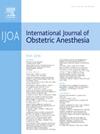The effect of preoperative carbohydrate loading on patients’ anxiety prior to elective caesarean delivery: a randomized controlled trial
IF 2.3
3区 医学
Q2 ANESTHESIOLOGY
引用次数: 0
Abstract
Background
Preoperative oral carbohydrate loading prior to elective caesarean delivery has been proposed to enhance recovery after surgery. However, its effect on patients’ preoperative anxiety remains uncertain. This study was, hence, conducted to evaluate the anxiolytic effect of oral complex carbohydrate drink in patients undergoing elective caesarean delivery. We hypothesised that patients who received preoperative oral carbohydrate loading would be less anxious before elective caesarean delivery.
Method
Patients undergoing elective caesarean delivery were randomized into two groups. The carbohydrate group (n=50) received 300 mL of iso-osmolar carbohydrate drink the night before surgery and two hours prior to surgery and the control group (n=50) received the same volume of regular water at the same time points. The primary outcome was preoperative anxiety, measured using the Amsterdam Preoperative Anxiety and Information Scale (APAIS). Maternal hunger, thirst and nausea, maternal and neonatal blood glucose levels, maternal urinary ketones and postoperative quality of recovery were the secondary objectives.
Results
The mean ± standard devation APAIS score before surgery were lower in the carbohydrate group compared to the control group, and the difference was statistically significant (4.56 ± 1.21 vs. 6.36 ± 1.55, mean difference −1.80; 95% CI −2.35 to −1.25; P=0.005). The patients in the carbohydrate group were significantly less hungry and thirsty compared to those in the control group, and had a lower incidence of urinary ketosis and a significantly higher quality of recovery on the first postoperative day.
Conclusion
Oral carbohydrate loading reduces preoperative anxiety in patients scheduled for elective caesarean delivery.
术前碳水化合物负荷对选择性剖宫产患者焦虑的影响:一项随机对照试验
背景:选择性剖宫产术前口服碳水化合物负荷被认为可以提高术后恢复。然而,其对患者术前焦虑的影响尚不确定。因此,本研究旨在评估口服复合碳水化合物饮料对择期剖宫产患者的抗焦虑作用。我们假设术前接受口服碳水化合物负荷的患者在择期剖宫产前焦虑程度较低。方法择期剖宫产患者随机分为两组。碳水化合物组(n=50)在手术前夜和手术前2小时给予300 mL等渗碳水化合物饮料,对照组(n=50)在相同时间点给予相同体积的常规水。主要结局是术前焦虑,使用阿姆斯特丹术前焦虑和信息量表(APAIS)测量。产妇饥饿、口渴和恶心、产妇和新生儿血糖水平、产妇尿酮和术后恢复质量是次要目标。结果碳水化合物组术前APAIS评分平均值±标准差低于对照组,差异有统计学意义(4.56±1.21∶6.36±1.55,平均差- 1.80;95% CI为−2.35 ~−1.25;P = 0.005)。与对照组相比,碳水化合物组患者的饥饿和口渴明显减少,尿酮症发生率较低,术后第一天的恢复质量明显提高。结论口服碳水化合物负荷可减轻择期剖宫产患者的术前焦虑。
本文章由计算机程序翻译,如有差异,请以英文原文为准。
求助全文
约1分钟内获得全文
求助全文
来源期刊
CiteScore
4.70
自引率
7.10%
发文量
285
审稿时长
58 days
期刊介绍:
The International Journal of Obstetric Anesthesia is the only journal publishing original articles devoted exclusively to obstetric anesthesia and bringing together all three of its principal components; anesthesia care for operative delivery and the perioperative period, pain relief in labour and care of the critically ill obstetric patient.
• Original research (both clinical and laboratory), short reports and case reports will be considered.
• The journal also publishes invited review articles and debates on topical and controversial subjects in the area of obstetric anesthesia.
• Articles on related topics such as perinatal physiology and pharmacology and all subjects of importance to obstetric anaesthetists/anesthesiologists are also welcome.
The journal is peer-reviewed by international experts. Scholarship is stressed to include the focus on discovery, application of knowledge across fields, and informing the medical community. Through the peer-review process, we hope to attest to the quality of scholarships and guide the Journal to extend and transform knowledge in this important and expanding area.

 求助内容:
求助内容: 应助结果提醒方式:
应助结果提醒方式:


